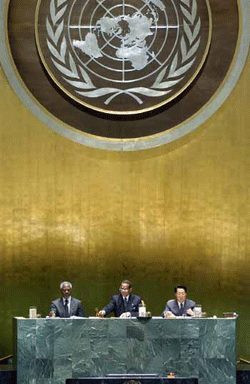United Nations 18 September 2003

In a letter to Assembly President Julian Robert Hunte, Foreign Minister of the Caribbean island nation of St. Lucia, Sudan’s Permanent Representative, Elfatih Mohamed Ahmed Erwa, said he was requesting the meeting on behalf of the 22-member Arab League “in the light of the inability of the Security Council to fulfil its responsibility for the maintenance of international peace and security due to the exercise by one of its permanent members of the veto.”
Tomorrow afternoon’s meeting will convene under the “Uniting for Peace” formula of 1950, under which the Assembly may call for “collective measures” when the Council fails “to exercise its primary responsibility for the maintenance of international peace and security in cases where there appears to be a threat to the peace,” Assembly spokesperson Michele Montas told a news briefing.
The 116-member Non-Aligned Movement supported Sudan’s request for the session, which will formally be a resumption of the 10th emergency special session on Palestine that adjourned in August 2002 and allowed for a resumption at members’ request.
Ms. Montas said no resolution had yet been submitted to the Assembly. “But I think the draft resolution will be pretty close to the resolution that was presented to the Security Council and that met with a veto,” she added.
As well as enjoining any Israeli action against Mr. Arafat, that resolution demanded “the complete cessation of all acts of violence, including all acts of terrorism, provocation, incitement and destruction, and expressed full support for the Road Map peace plan.”
The Road Map put forward by the so-called diplomatic Quartet - UN, European Union, Russian Federation and United States - calls for parallel and reciprocal steps by Israel and the Palestinians leading to two states living side by side in peace by 2005.
The United States vetoed the text because it said it failed to explicitly condemn “Hamas, the Palestinian Islamic Jihad and the Al Aksa Martyrs’ Brigade as organizations responsible for acts of terrorism” and all for the dismantlement of “an infrastructure which supports these terror operations wherever located.”
Only the United States and the four other permanent Council members - China, France, Russian Federation and the United Kingdom - have veto power.